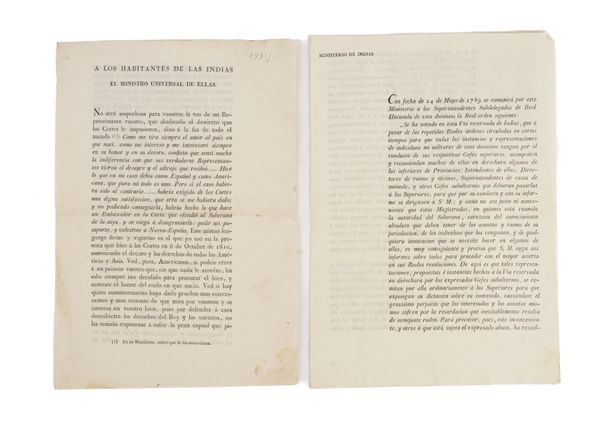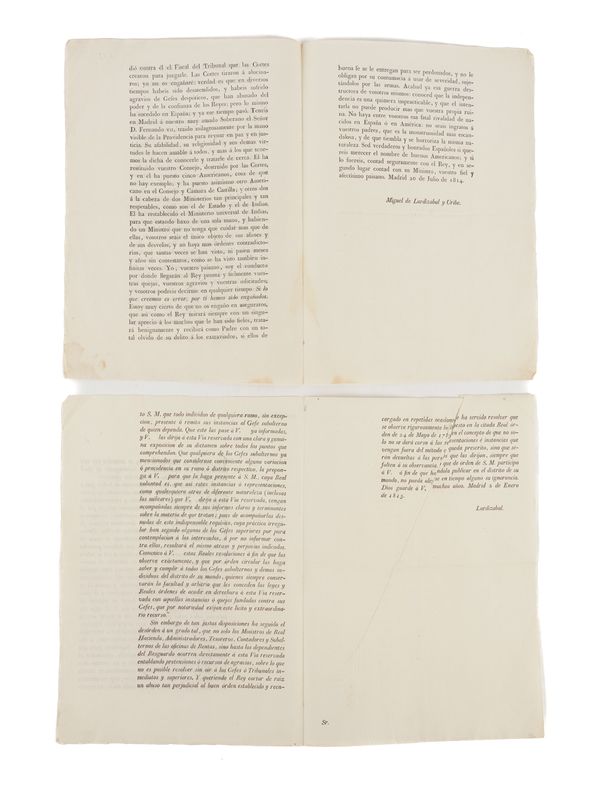Buyers Premium 25% + VAT | VAT is not applicable on bound books
MEXICAN WAR OF INDEPENDENCE - Miguel de Lardizábal y URIBE (1739-1820). 2 printed proclamations in Spanish, each 3-pages in a single bifolium, [n.p. but Madrid and/or Mexico City], 1814, 1815. (2)
| Estimate: | £300 - £500 |
| Hammer price: | £120 |
MEXICAN WAR OF INDEPENDENCE - Miguel de Lardizábal y URIBE (1739-1820). 2 printed proclamations in Spanish, each 3-pages in a single bifolium, [n.p. but Madrid and/or Mexico City], 1814, 1815.
In the first proclamation, the Mexican-born, but fiercely pro-Spanish, Miguel de Lardizábal y Uribe, in a stirring piece of rhetoric made in his capacity as the "Ministerio Universal de las Indias", makes a reasoned, conciliatory and, at times, emotionally manipulative plea to the insurgents of Mexico to put down their weapons and abandon their plans for independence from Spain, but to no avail. With the signing of the "Treaty of Cordoba", Mexico achieved full independence on August 24, 1821. The following is a translation of the proclamation from the original Spanish.
"To the Inhabitants of Mexico ("Indias"). From their Universal Minister. The voice of one of your representatives will not be suspicious to you, who, alluding to the exile that the Cortes [in Spain, the two houses constituting the national legislative body] imposed on him, said before the face of the whole world: As I am always drawn by the love for the country where I was born, as I am and will always be interested in its honour and its decorum, I confess that I felt greatly the indifference with which its true Representatives viewed the disgrace and the outrage that it received ... I did what in my case I should have done as a Spaniard and as an American, which for me are all one. But if the case had been the opposite ... I would have demanded from the Cortes a worthy satisfaction, which I believe would have been given to me; and, not being able to obtain it, I would have done what an Ambassador to the Court does who has offended the Sovereign of his own, and refuses to make amends: ask for a passport, and return to New Spain. This same firm and vigorous language is what I used in the protest I made to the Cortes on October 6, 1810, upholding the dignity and rights of all the Americas and Asia. See, then, Americans [i.e. Mexicans], if you can believe a fellow countryman of yours who, without being daunted by anything, has always been so determined to seek the good and uphold the honour of the land where he was born. See if there is anyone who has consistently provided more convincing and costly proof that he looks out for you and is interested in your well-being. For by openly defending the rights of the King and yours, he has not been afraid to expose himself to the capital punishment requested against him by the Prosecutor of the Court that the Cortes created to try him. The Cortes tried to delude you. I will not deceive you: it is true that at various times you have been neglected, and have suffered wrongs from despotic leaders, who have abused the power and trust of the King and Queen; but the same has happened in Spain; and that time has passed. You have in Madrid our beloved Sovereign, Ferdinand VII, miraculously brought by the visible hand of providence to reign in peace and justice. His affability, his religiosity, and his other virtues make him lovable to all, and even more so to those of us who have the good fortune to know him and associate with him closely. He has restored your Council, destroyed by the Cortes, and has placed five Americans in it, something beyond compare; and he has also placed another American in the Council and Chamber of Castile; and two others at the head of two Ministries as important and respectable as those of the State and the Indies. He has re-established the universal Ministry of the Indies, so that, being under a single authority, and having a Minister who has only the Indies to care for, you will be the sole object of his efforts and his concerns and there will be no more contradictory orders, as have been seen so often, nor will months and years pass without a reply, as has also been seen countless times. I, your countryman, am the conduit through which your complaints, your grievances, and your requests will reach the King promptly and faithfully; and you will be able to tell me at any time: if what we believe is an error, we have been deceived by you. I am very certain that I am not deceiving you in assuring you that, just as the King will always look with singular appreciation on the many who have been faithful to him. He will treat kindly and receive those who have gone astray as a father, completely forgetting their crimes, if they surrender in good faith to be pardoned, and do not force him by their contumacy to use severity, restraining them by arms. End this self-destructive war now: know that independence is an impracticable chimera, and that attempting it can only produce your own ruin. Let there not be among you that fatal rivalry between those born in Spain or America: do not be ungrateful to your parents, which is the most scandalous monstrosity, and at which nature itself trembles and is horrified. Be true and honourable Spaniards if you wish to deserve the name of good Americans; and if you are, count surely on the King, and secondarily on his Minister, your faithful and most affectionate countryman. Madrid, 20 July 1814. Miguel de Lardizabal y Uribe."
The second proclamation is more administrative and bureaucratic in tone, presumably intended for an internal rather than a public readership, opening, "Ministerio de Indias. It has been noted in this reserved route of the Indies, that despite the repeated Royal orders circulated at various times so that all instances and representations of non-military individuals of these dominions come through the channel of their respective superior Chiefs, many of them are directly accompanied and recommended by some of the inferiors of the Provinces, Intendants of them, Directors of branches and offices, Superintendents of mints, and other subordinate Chiefs who should pass them on to the Superiors, so that through them and with their report they could address His Majesty; and since it is neither fair nor convenient that these Magistrates, in whom the authority of the Sovereign is vested, lack the absolute knowledge they should have of the affairs and branches of their jurisdiction, of the individuals who comprise them, and of any innovation that needs to be made in some of them, it is very consequent and necessary that His Majesty hear their reports on all of them in order to proceed with the greatest success in his Royal resolutions ... [etc]" It is dated 2 January, 1815, and signed off (in print) "Lardizabal" (the second leaf with a small hole not affecting letters and creased diagonally across). (The translations were made using 'Google Translate', occasionally edited for clarity of sense or vocabulary.) (2)

